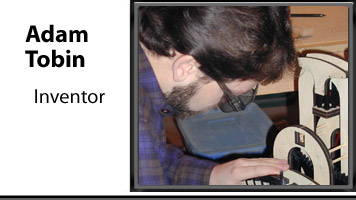what it means that
my local coffee shop was
so impressed I
paid for this
coffee with cash.
“Look at you!”
the proprietress
said.
The dentist
says my son doesn't have an adult tooth under one of his baby teeth. He's got a baby foot. That's weird, right?
The Joy
The joy of
owning your own
gumball machine
is that you never feel
cheated when a
gumball doesn’t fall.
Also:
the gumballs.
“Some nights,”
he said, shadows
dancing over their heads
like bones,
throwing another
pile of metal in the fireplace
to use later as
warmers,
pressing refresh
on the numbers page
of his mobile device,
“if you listen closely
you can literally
hear
the economy
slowing down.”
His hair
dirty gray, piled high like
handfuls of baby sheep
stacked and teetering.
the air
sharp with cotton candy
drift
that leaps toward
the understanding part.
you can’t hold it back.
a pillow
he’s reaching for it now
to prop up all
those teetering stacks,
to ease his way into
a dream of sharp fluff.
An Interview with the Exploratorium’s Adam Tobin, Part Two

In which Tobin talks about mechanical art and what makes for a great toy, and shares ruminations from a Muppet colloquium.
Welcome to the second part of this interview with toy inventor/Director of Exhibit Development Adam Tobin. If you haven’t already, be sure to also check out Part One.
On the Web: The Exploratorium; Wordle preview
Cecil Vortex: I read that you also create mechanical art. What’s that work like?
Adam Tobin: After I sold the first toy company, I had a few larger-scale projects I’d always wanted to pursue. The first thing I wanted to make was a clock that told time with rolling marbles. I’d wanted to make it since I was a kid. And I started making it and ended up making a few other contraption-type pieces. It was just such a joy for me, after years of designing things to be mass produced to say, “I’m just going to make one, and I’m not as concerned about how you can make 10,000 of these.” In essence, they were very large one-of-a-kind toys.
CV: Do you still work on those projects?
An Interview with the Exploratorium’s Adam Tobin, Part One

In which Tobin talks about growing up as a child-inventor, the Exploratorium workflow, and the challenges of summoning an “ah-ha!” moment on a deadline.
Bio: Adam Tobin is the Director of Exhibit Development at San Francisco’s famed Exploratorium. Before that he was an entrepreneur and an award-winning toy inventor whose creations included Frigits, Getups, Tub Tunes Water Flutes and Drums, and SuperFort. His creations are sold around the world and have been featured in New York Magazine, Discover Magazine, CBS Morning News, Fox News, CNN, Regis and Kelly Ripa, and the New York Times.
This is the first half of a two-part interview. Jump here for the second half.
On the Web: The Exploratorium; Wordle preview
Cecil Vortex: Do you remember your first invention?
Adam Tobin: I started as an electronics tinkerer. I made a burglar alarm to keep my sister out of my room. I took an old car radio that had been abandoned from one of the old family cars and got inside it and wired up quadraphonic sound in my bedroom. I began making wooden toys when I was young as well, like whirligig and rolling marble toys.
CV: Were you raised in a family of inventors, or was it something you got into on your own?
AT: I don’t know where it came from. My father can’t pick up a hammer…. For some reason, with me, I was just a tinkerer from the get-go.
CV: How did your parents respond?
Virtual LP: Time After Time
I’ve fallen back in love with the piano. In particular, I can’t stop playing one of my very favorite songs — “Time After Time” by the unbeatable Cahn and Styne. Holy cow could those fellows write a tune. There are incredible versions of this out there by the likes of Sinatra and Chet Baker. A personal favorite is by Alex Chilton, off Cliches (highly recommended).
I took a crack at recording a cover of this beautiful song this evening. As with pretty much all the tracks on the Virtual LP, this is a relatively short number — a smidge over 60 seconds. Just piano and vocals. I even resisted my usual urge to overtreat the voice. A fun Sunday night project. The house was warm, the way houses get when it’s snowing outside. Only, no snow…. Hope you enjoy it, and thanks for listening,
-Cecil
time: 1:06 seconds; specs: 1.6M
Press Play to play.
1987
In Times Square, it’s
twenty minutes
past midnight,
there’s a broken champagne
bottle at our feet,
slipped loose
from a pal’s
whoops.
Garbage floats by like kids
in a Halloween parade. Cops
clip-clop past on horseback, keeping
elevated sight lines secure.
And that’s about it.
The crowd’s gone.
Seeped through grating
down to the rumble.
Cold streets left to
we scattered few
post-apocalyptic
topsiders.
Too
He ate
too many oysters
there’s a barbecued
pearl
forming
somewhere.